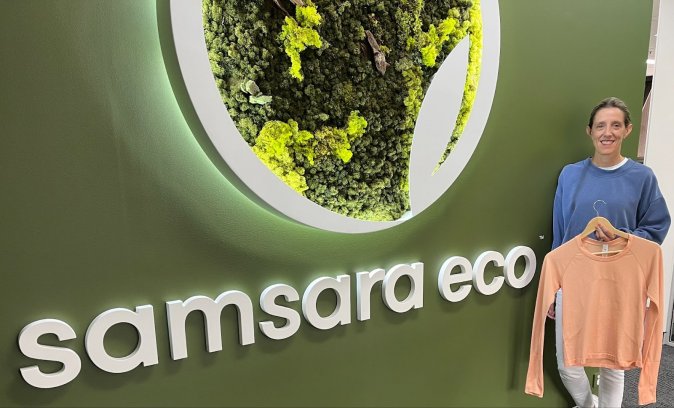
Recycled nylon 6.6 plant for Southeast Asia
Australia’s Samsara Eco and lululemon unveil world’s first enzymatically recycled nylon 6,6 product.

23rd February 2024
Knitting Industry
|
Canberra, Australia
Australian enviro-tech start-up, Samsara Eco, and its partner, athletic apparel brand, lululemon, have launched what they call the world’s first enzymatically recycled nylon 6,6 product. Using recycled nylon 6,6 made with Samsara Eco’s technology, lululemon has created samples of its iconic Swiftly Tech Long-Sleeve Top, representing the first time this type of nylon has been recycled in this way. The samples represent a key milestone that brings the fashion industry one step closer to creating a circular ecosystem, the company says.
According to Samsara Eco, roughly 4 million tonnes of nylon 6,6 is created per year. It is a commonly used plastic in the textile industry and is a foundational fibre used by lululemon to make many of its bestselling products. Nylon 6,6 has been notoriously difficult to recycle and because of its tough, heavy-duty properties has been used in a breadth of industries like fashion, automotive and electronics.
Working with lululemon, Samsara Eco has pioneered a new (patent pending) technology that makes it possible to put waste to work by extracting nylon 6,6 from end-of-life stage textiles and demonstrates the potential to create a fully circular ecosystem for apparel.
“Until now, textile-to-textile nylon 6,6 has been unrecyclable. The samples we have created with lululemon represent a world-first breakthrough for the future of textile waste. Our work with lululemon shows the potential to give clothes an infinite life,” said Paul Riley, CEO and Founder of Samsara Eco.
The Swiftly samples illustrate lululemon’s end-of-life vision of circularity by taking lululemon nylon apparel at the end-of-life stage — including lululemon leggings — and combining it with other non-textile materials to create recycled nylon for use in new lululemon products. Using its library of plastic-eating enzymes, Samsara Eco’s manufacturing process is completed within hours and at a low temperature, to create a product that is more sustainable.
“We’re committed to maintaining a low carbon footprint during our infinite recycling process. Compared to the production of virgin nylon 6,6, Samsara Eco’s infinite recycling process reduces emissions and has the potential to save tens of millions of tonnes of CO2 entering our environment every year. We’ve started with nylon 6,6, but this sets the trajectory of what’s possible for recycling across a range of industries as we continue expanding our library of plastic-eating enzymes. This is one giant leap for the future of sustainable fashion and circularity,” added Riley.
Over 90% of the nylon used in each of the lululemon Swiftly top samples is produced using Samsara’s enzymatic recycling process, and the samples offer the same fit, feel and quality guests expect from lululemon products. “Our enzymatic recycling is the only solution on the market that allows the textile industry to unlock nylon 6,6 amongst mixed feedstocks to prevent textiles from ending up in landfills,” explained Sarah Cook, Chief Commercial and Operations Officer of Samsara Eco.
In 2023, Samsara Eco announced its partnership with lululemon as its first textile partner. The Swiftly samples represent the next stage in the collaboration, creating lower-impact alternative textiles in the apparel industry.
This milestone in lululemon’s multi-year collaboration with Samsara Eco is one way lululemon is advancing its goal to make 100% of products with preferred materials and end-of-use solutions by 2030. These samples are an important step that validates the role innovative partners like Samsara Eco can play in supporting businesses to reach their sustainability goals.
“The lululemon Swiftly top samples go beyond material innovation – they represent the exciting possibilities and impact that can be achieved through collaboration and cross-industry partnership. This breakthrough not only signals a turning point for sustainable innovation in apparel but for all industries looking to shift towards more circular models. We look forward to continuing to work with Samsara Eco to help scale this new technology in the months and years ahead,” said Yogendra Dandapure, Vice President, Raw Materials Innovation at lululemon.

Business intelligence for the fibre, textiles and apparel industries: technologies, innovations, markets, investments, trade policy, sourcing, strategy...
Find out more